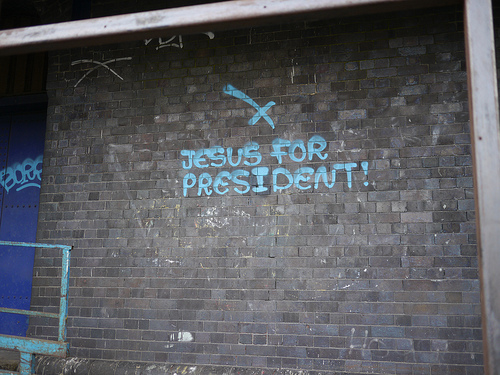We run our website the way we wished the whole internet worked: we provide high quality original content with no ads. We are funded solely by your direct support. Please consider supporting this project.

12 Reasons for Keeping the Kingdom of God Separate from Politics, Part 2
Image by the justified sinner via Flickr
- Satan is the “god of this age” (2 Cor 4:4) and “ruler of the world (Jn 12:30; 14:31) who “controls the entire world” (1 Jn 5;19) and possesses all the power of “all the kingdoms of the world” (Lk 4:6). While governments are ordained by God to preserve law, order, and justice (Rom 13), and while some governments do this better than others, kingdom people must always know that there’s a demonic element also at work in all governments and thus must take great care to keep the kingdom of God distinct from all of them.
- Among Jesus’ followers was a tax collector (ultra “right wing”) and a zealot (ultra “left wing”). Yet Jesus never once comments on either of their views, thereby revealing that such political differences are irrelevant to the alternative kingdom Jesus came to establish. When Christians today associate one political party or nationalistic agenda more closely with the kingdom of God than others, we compromise the separateness (the “holiness”) of the kingdom of God and then inevitably divide the body of Christ.
- Christians are called to be soldiers for the kingdom of God and thus not to be “entangled in everyday affairs” (e.g. the politics of the region where we’re stationed as soldiers). We are rather to seek “to please our enlisting officer” (2 Tim 2:4), Jesus Christ, who calls us to do nothing more or less than imitate him in his loving service to people as a witness to the alternative kingdom he was establishing in the world. Our witness is our willingness to serve and suffer for people whose lifestyle we may object to and even people who may despise us.
- Without exception, whenever the Church as succeeded in gaining what so many Christians try to acquire—political influence—it has resulted in a government that is bloodier than most secular governments. If Scripture is not sufficient to teach us to keep the kingdom of God completely separate from the politics of the world, history should be!
- Whenever the Church succeeded in gaining political influence, it has eventually all but destroyed the Church. All the areas once “ruled” by Christians are now more pagan and hostile to the Gospel than unreached areas (Europe for example). This is not an accident, for the Church is called to be a servant, not a master, of the world.
- The association of Christianity with political and nationalistic agendas has caused untold harm for missions around the world. Many today understandably resist the Gospel because they associate it with atrocities committed by countries identified as Christian in the past (e.g. Europe) or the present (America). For the sake of the Gospel, kingdom people need to proclaim that neither America nor any other country is or ever was “Christian.” The kingdom Jesus came to establish, and the kingdom we’re called to represent, is “not of this world” (Jn 18:36).
Category: General
Tags: Kingdom, Kingdom Living, Politics
Topics: Ethical, Cultural and Political Issues
Related Reading

Put on the Armor of God
The whole of the Christian life is an act of war against the enemy as we follow Jesus in storming the gates of hell (See post.) No passage better illustrates this than Paul’s metaphor of spiritual armor from Ephesians 6. He writes that Christians are to “be strong in the Lord and in the strength…

Podcast: Should Christians Seek Political Office?
Can a politician even be effective at politics if they are faithful disciples of Jesus? Links: Greg’s book: “The Myth of a Christian Nation“ http://traffic.libsyn.com/askgregboyd/Episode_0024.mp3

The Warfare We Have Inherited
Image by Chris Sardegna Jesus’ miracles over nature, as well as his healings, exorcisms and especially his resurrection, were definite acts of war that accomplished and demonstrated his victory over Satan. These acts routed demonic forces and thereby established the kingdom of God in people’s lives and in nature. But their primary significance was eschatological. People…

Vacationing in a War Zone
Suppose a family decided to go on vacation to a nice cabin on a beautiful shore in a distant country. This vacationing family naturally wanted to tune out the problems of the world, indulge themselves, relax and enjoy life and each other as much as possible. This is simply what families do on vacation. Now…

Approaching Chronic Illness with Wisdom
CNN posted this article on what to say and what not to say when someone you love is suffering with chronic illness. Sometimes our best intentions cause more harm than good, and we need to approach people in pain with a great deal of wisdom and sensitivity. From the article: When people we care about…

What is the Kingdom of God (Part 1)
We all know what the Kingdom of God is, right? But this is precisely the problem. Since we are all to a large extent products of our culture, what seems obviously true and right to us will be at least influenced, if not determined, by what seems obviously true and right to our culture. This,…
